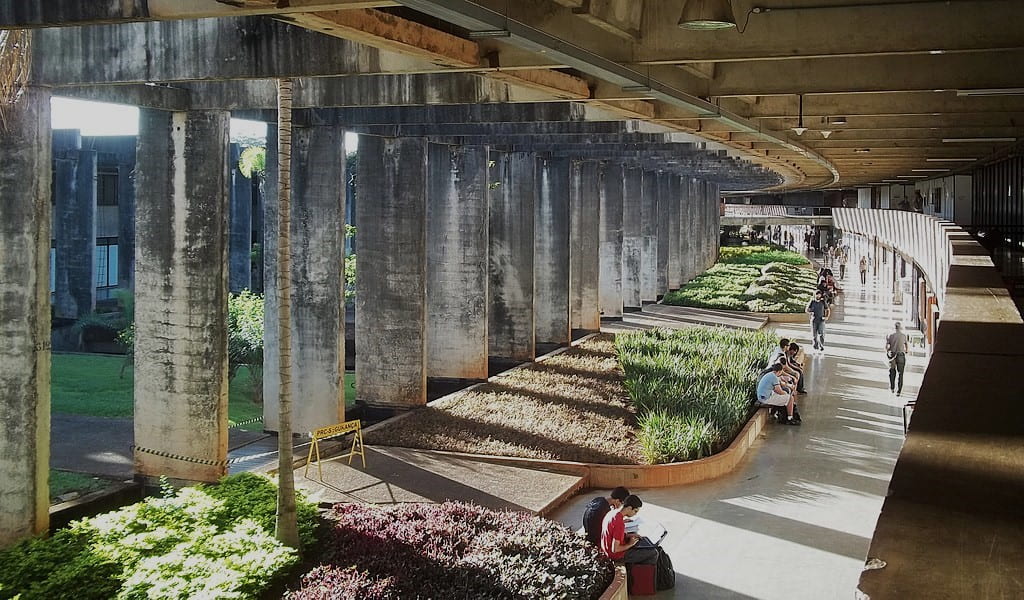By Anamaria Fonsêca.
In April this year I visited the University of Brasilia (UnB), Brazil, with Professor Foluke Adebisi from the Bristol Law School to take part in a series of lectures organised by the postgraduate programmes in Law and in Human Rights. I have been collaborating with UnB’s Research Group on International Private Law, International Trade and Human Rights since the outbreak of the pandemic to develop research that builds bridges between Brazil and the UK. The invitation to visit UnB this year was an opportunity to advance this work and the internationalisation of both UnB’s and the University of Bristol’s research.
UnB is among the top five universities in Brazil, excelling in terms of internationalisation, affirmative action programmes, research quality and teaching standards. Our visit specifically aimed to establish a dialogue between the Bristol Law School (through Foluke) and MMB (through me) and the Law School of UnB and their internationalisation department. Foluke brilliantly lectured and established dialogues on law, legal education and decolonisation, while I was responsible for diffusing preliminary results from my doctoral research, specifically on the topic of ‘Creating Immigration Hostile Environments: A Case Study from England’. The aim was to draw parallels between the legal and public policy frameworks of countries in the global north, such as the UK, and countries in South America, such as Brazil, which has had its refugee reception policies significantly affected by the change of government in recent years. The aim was to think about how political ideologies through political parties interfere in the establishment of mechanisms for the implementation and promotion of human rights, in this case specifically for asylum seekers and refugees.

Addressing the creation of hostile environments for migrants is impossible without raising three key issues: the concept of national sovereignty; the Western geopolitical perspective on human rights; and xenophobia and racism rooted in a superficial lack of identification with the ‘other’, whether due to physical characteristics or their social, economic and political contexts.
Many cases of migration are a post-colonial phenomenon, which continues to link the colonising nations and those previously colonised. The presence in the UK, for example, of people whose origins are not far removed from Africa, Asia or Latin America reflects the ties created by the British empire. With this in mind, I began my presentation with a case study of England, the first country to talk openly about the creation of a hostile environment for migrants after Theresa May, then-Home Secretary, coined the term during a period of heated debate about migration in the UK.
At UnB we were welcomed by Professor Inez Lopes Matos, coordinator of the Research Group on International Private Law, International Trade and Human Rights. Professor Loussia Felix and Professor Menelick de Carvalho Netto also took part in the panels involving the decolonisation of legal education and the decolonial approach to the category of asylum seekers and refugees. This deepened and refined discussions and demonstrated how much the approach of MMB can be strengthened through partnerships with UnB and vice versa. Students from the postgraduate courses in Law and Human Rights expressed great interest in establishing more knowledge exchange with professors, researchers and students linked to MMB in order to broaden their Lusophone approach to key themes of interest of the research group. These themes include:
1. Political violence and post-conflict reconstruction in communities experiencing local, national and cross-border displacement. In Brazil, the growing community of Venezuelan migrants and refugees is a focus point for research. Students’ discussions provided an account of Operação Acolhida (Operation Welcome), a government mission responsible for welcoming and integrating migrants and refugees from Venezuela, and the political effects that such an operation has in terms of a regional responsibility for human rights, given Venezuela’s suspension from Mercosur since 2017.
2. Labour and mobility and the historical legacy of slavery in contemporary work relations. The students’ research interests are also focused on historical reparations for black and indigenous people in the process of construction of Brazil as a sovereign nation, its direct link with the trafficking of people from West Africa and the consequences of a late abolition of slavery. Their other studies look at types of labour analogous to slavery, which in Brazil ranges from unpaid domestic and social reproduction work to land exploitation.
3. Representations of territorial boundaries and the tensions between political and ecological rights. The research group is also interested in the plight of indigenous communities, specifically during the Bolsonaro administration when more land was expropriated, and the Amazon’s natural heritage was further destroyed. While we were in Brasilia there were protests against the Marco Temporal (Time Limit Trick), which recently came to a vote in the Supreme Court and was not approved – a victory for indigenous peoples for the time being.
4. Neoliberal market expansion, wildcat economics and the movement of people and capital to and from the global margins. The Brazilian and South American experience of late capitalism is another theme within the research group, in particular the consequences of colonisation on the country’s political, economic, social and cultural structures.
5. The circulation of ideas and translational exchanges across borders within Latin America and beyond. Brazil’s ‘distance’ from other Latin American nations in terms of identity and culture is also a key theme, again taking into account the legacy of colonisation. This includes the experience of joining forces with other Latinx, and more particularly South American, countries through international agreements, which have encouraged the integration and recognition of Brazilians as Latinxs, and the repercussions that these socio-political aspects have on the country’s development.
Our conversations with the UnB students and staff around these themes were enriching and productive, and highlighted the many ideas to be developed, lessons to be learned and collaborations to be established between the two universities, particularly through their role in developing their countries’ intellectual and political spheres. We look forward to this collaboration bearing fruit for both academic environments.

